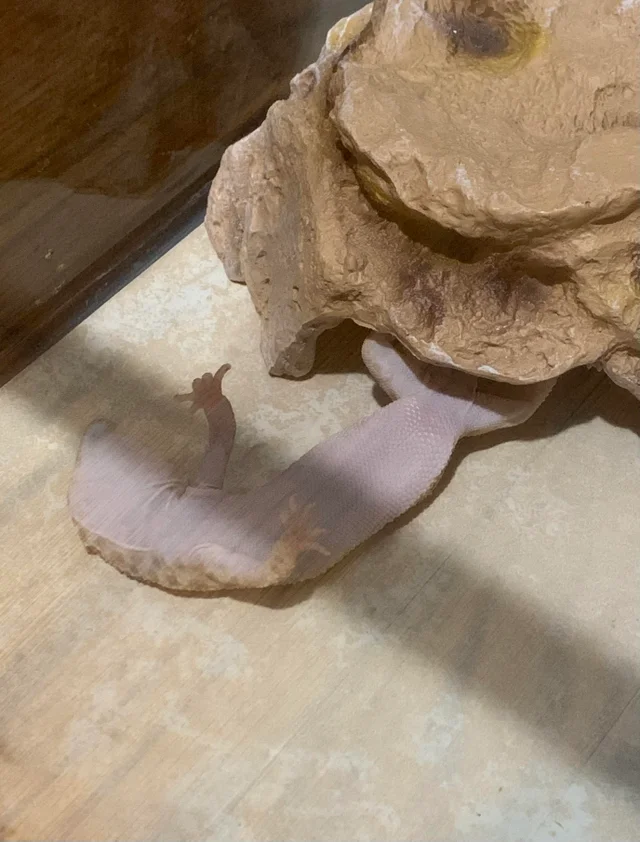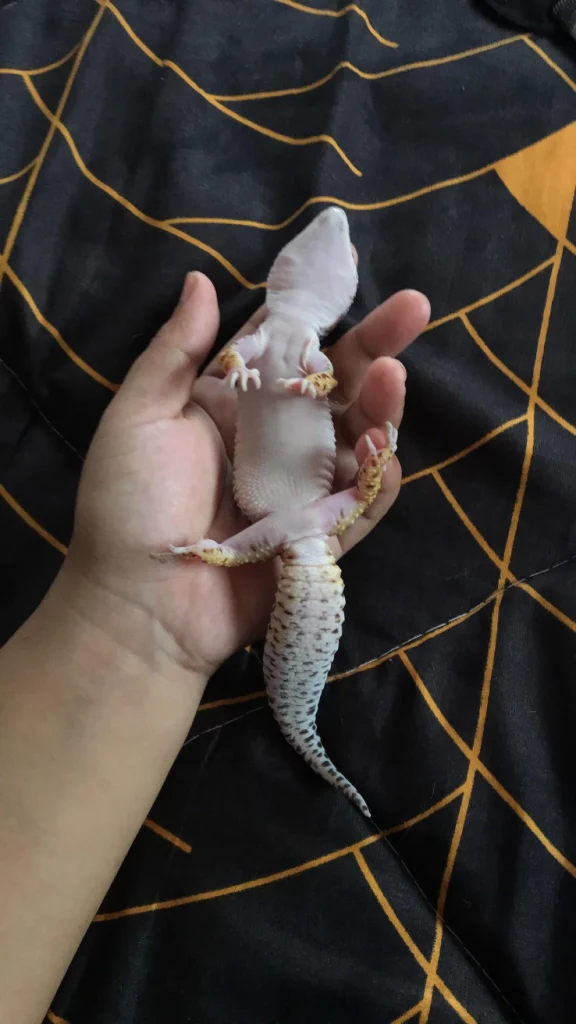It’s so lovely to see your leopard geckos playing around the place. They are really good companions when you’re having a bad time. I love this little creature, especially for its non-aggressive behavior. Its playfulness is also one of the reasons why I love keeping them with me.
But the question, why is my leopard gecko upside down? It’s unfortunate if your leopard geckos keep flipping over. Because it indicates the disease enigma syndrome (ES) which is almost incurable and sometimes, pushes your favorite pet to slow death. Even if you can’t cure them, you can try to make their life a bit easier with proper care.
I have discussed the issue in more detail. By the end of the article, you can learn about the symptoms of this disease, and how to take care of the affected one. So keep going through.
Why is My Leopard Gecko Upside Down?
When a leopard gecko has enigma syndrome, it constantly upsides down, not eating, and death rolling. Basically, it’s a neurological condition when the leopard gecko’s brain cells (which are responsible for the balance don’t work properly or get damaged).
It generally runs through the lineage. This genetic disease causes such conditions where the affected creature loses its sense of the relative physical position. With the flow of time, the condition gets worsen.
In adulthood of the creature, you will slowly notice this behavior which becomes regular after a short period of time. So, you might not be able to tell if the leopard gecko you are buying has ES or not.
How Do You Tell if a Leopard Gecko Has an Enigma Syndrome?

If you see your leopard gecko flipping over onto its back only a few times, don’t come to the conclusion that it does have enigma syndrome. Look for consistency and other symptoms also. So, let’s go through the most common symptoms of enigma syndrome you would find in a ground-dwelling lizard.
1. Changes in Behavior and Body Language
When a leopard gecko has ES disease, the gecko owner sees changes in the way it always behaves. For example, repetitive behavior like doing something, again and again. It is a common condition of the Enigma syndrome.
2. Won’t Eat Well
A leopard gecko’s ability to eat food get affected by ES disease. The affected individual needs assistance in eating food. She doesn’t even show interest in eating its favorite thing like meal worm. So, you must learn how to feed your pet well.
3. Death Roll
It’s pathetic to see a leopard gecko death roll. You know, you can’t make it stop even if you do want. It will repeatedly move in a circle. If you notice, this behavior, it surely indicates the enigma syndrome.
Many ask the question that if the death roll can be stopped by any means. Unfortunately, there is no cure yet. Scientists are still researching this issue and haven’t made any great progress.
4. Eyes Aren’t in Focus
You will notice that your leopard gecko has difficulty focusing on things. It keeps looking up at times. Besides, it also loses its ability to catch insects for food as it loses its focus ability.
Day by day, the situation gets more serious. So, if you notice these symptoms in your leopard gecko, it is likely to have ES.
5. Vibration Tendency
An affected leopard gecko with enigma syndrome loses control of its muscle. So it keeps shivering at times. Hence, vibration to shaking could be a sign of the ES also. But make sure to cross-check the other symptoms before coming to a conclusion.
How To Care For A Leopard Gecko With Enigma Syndrome

As the leopard gecko with enigma syndrome becomes sensitive, you must take proper care of it. At first, I would suggest creating a separate space for it. Let it be alone, and have its time. It will cause less stress. And you know stress is not good for the gecko’s health.
Besides, keep the surroundings noise-free. And avoid using bright light around it. Noise and bright light create stress for the affected one and worsen the situation.
The most important thing is, you must take care of its regular eating habit. Enigma syndrome causes indigestion and the inability to catch the insect to eat. So, in the long run, the leopard gecko suffers from malnutrition and gets skinny.
Sometimes, you must feed it forcefully. I know it might be hard for you. But it’s the only way sometimes left. With proper care, you can slow down the progress of enigma syndrome. So, keep following the above tips for your leopard gecko with ES.
Wrap-up
If your leopard gecko does the upside down, the best suggestion I would give you is to go to a reptile vet. Get suggestions according to the symptoms and follow them. Because the severity of the enigma syndrome can vary from one to another. In the meantime, follow the precaution I have shared above.
Frequently Asked Questions
How do I know if my leopard gecko is sad?
Generally, leopard geckos are quite playful. When they are sad, they tend to show unwillingness to move or eat. So, check it out if your favorite pet is upset with you or not.
How long do geckos with Enigma syndrome live?
It depends on the severity of the ES. With mild enigma syndrome, a gecko can live around 20 years. but the average lifespan with general enigma syndrome is less than 10 years.
What scares a gecko?
Leopard geckos are not comfortable with lemon peel, onion, peppermint, garlic smell, Eucalyptus etcetera. So, if you don’t want to make your gecko uncomfortable, keep these things away from them.
What is Enigma Syndrome in Leopard Geckos
Enigma syndrome in leopard geckos is a genetic condition affecting their neurological development. It causes uncoordinated movements and difficulty in eating, shedding, and breeding. Affected geckos may display erratic behaviour and have a shortened lifespan. Leopard gecko owners need to be aware of this syndrome and provide appropriate care and support for affected individuals.



